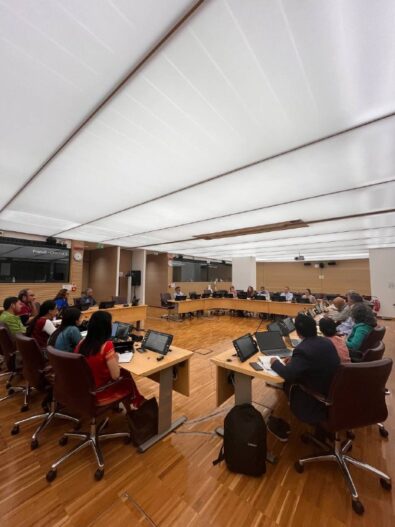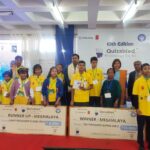
The Rome based Indigenous Partnership for Agrobiodiversity and Food Sovereignty (TIP), headed by Bah Phrang Roy (Founding Chairperson of NESFAS), conducted a Fellowship Training of Indigenous Peoples Youth from June 2-7, 2024. The participants were from Meghalaya, Northern Thailand and Mexico and discussions were on how to inform mainstream institutions of the often ignored benefits of Indigenous Peoples Food Systems for people, nature and climate.
The Indigenous Youth from Meghalaya included Badarishisha Nongkynrih and Naphishisha Nongsiej from the Khasi Peoples of North East India and Gratia E. Dkhar from the Jaintia Peoples of North East India. They were joined by former TIP fellow Pius Ranee, Executive Director of NESFAS.
A little about NESFAS:
The organisation attempts to bring together partners from different sectors that can help in the enhancement of local nature-based food systems, leading to food sufficiency, improve nutrition, green livelihoods and climate resilience.
The TIP Fellowship Programme provided a platform for Indigenous youth to gain and share insights on global initiatives impacting their communities and to give global partners an opportunity to hear directly from players like the NESFAS staff. It has so far fostered networking, knowledge exchange, and the development of actionable frameworks to support the resilience and sustainability of Indigenous food systems and livelihoods.
One of the highlights of the fellowship was the Fellow’s interaction with the Secretariat of the Global Hub on Indigenous Peoples’ Food Systems in FAO. They were also invited by IFAD to a meeting of the Rome based UN Agencies with the Government of Switzerland and others to a session in IFAD on the use of the Minimum Dietary Diversity for Women as an important indicator of meeting Sustainable Development Goals (SDGs).
Gratia E. Dkhar, supported by Dr. Dhrupad Choudhury, presented evidence of high agroecology outcomes generated by diverse Indigenous Peoples’ Food Systems. The evidence was generated by a global study undertaken by TIP using the Food and Agriculture Organization’s FAO’s Tools for Agroecology Performance Evaluation (TAPE) methodology and complemented with participatory storytelling.

The global TAPE study was conducted in four countries across 16 landscapes represented by the Karen People of Northern Thailand, the Khasi, Garo, and Karbi Peoples of North East India, the Qgiek Peoples of Kenya, and Yucatec Maya Peoples of Mexico to address the important evidence gap relating to IPFS and their contribution to current debates around global food system sustainability.
In one of the sessions, Naphishisha Nongsiej informed the Fellowship participants of the initiatives of about 5000 youth who taking part in the programmes of NESFAS to enhance climate resilience, biodiversity conservation, nutritional improvement, and sustainable livelihoods within Indigenous Peoples’ food systems.
In addition to the professional and educational activities, the fellowship participants enjoyed a cultural experience, “The Romance of Rome ” and its history, presented by Larry Litman, a friend of TIP and NESFAS. This was followed by a city tour, which provided a rich historical and cultural context to the programme.
ALSO WATCH:






